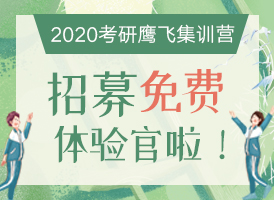考研英语阅读理解中的文章,很多来自一些外刊杂志方面的题材。接下来,北京文都考研网为扩宽2020考研学子的知识面,整理了考研英语经济学人外刊:大学应该增难招生门槛吗?供考生参考。
2020考研英语经济学人外刊:大学应该增难招生门槛吗?
Selective universities appear not to increase inequality
好的大学并不会加剧教育的不平等
So the evidence from France and Finland suggests
法国和芬兰的证据足以证明
Among the gilets jaunes on French streets last month were students protesting against the way the government is changing the university admissions system from one that admits pretty much everybody to one in which there is a modicum of selectivity.
上个月法国街头爆发了一场“黄背心运动”,参与其中的学生们抗议政府对大学录取制度的改变:从以前的几乎人人都可以读大学,到现在的增加了些许选择性。
Objectors complain that the changes are inegalitarian. But figures from the OECD, a rich-country club, show that some of the most equal countries in Europe have the most selective systems, and vice versa.
反对者抱怨称,,这样的改变有失公平。但是,世界经合组织(一个富国俱乐部)的数据显示,欧洲一些最平等的国家有着最挑剔的招生制度,反之亦然(那些不平等的国家才有着宽松的政策)。
Finland’s tertiary education system is one of the most selective in Europe.
芬兰有着欧洲最挑剔的高等教育体系,只有三分之一的大学申请者会被录取。
Only a third of those who apply get in. Yet Finland also has one of the highest levels of intergenerational mobility in Europe, whether measured by educational outcomes or by the difference between parents’ and children’s social class.
但芬兰同时是欧洲代际阶层流动性(无论是以教育成果还是以父母与子女的社会阶层差异来衡量)最高的国家之一。
Finland’s tertiary education system enjoys an unusual degree of autonomy: most of its universities are independent of the state.
芬兰的高等教育体系高度自治:大多数的大学都是私立大学。
France’s university system, by contrast, has been run as an arm of the state since Napoleon decreed that it should be so in 1808, and it is one of Europe’s least selective systems.
相比之下,自拿破仑于1808年颁布法令以来,法国的大学体系一直隶属于国家,是欧洲最不挑剔的高等教育体系之一。
University entrance is regarded as a right; students can sign up for courses in subjects they know nothing of. Last year’s reforms, which allow universities to require students to take remedial classes if deemed necessary, will make little difference to that.
读大学被视为一项权利,学生甚至申读自己一无所知的专业。去年的改革允许大学在必要时要求大学生参加补习班,但这无助于现状的改变。
Yet despite France’s inclusive tertiary system, the country performs poorly in terms of intergenerational mobility, whether measured by educational outcomes or professional class.
然而,尽管拥有高度包容性的高等教育体系,但法国在代际阶层流动性(无论是以教育成果还是以职业阶层来衡量)方面却表现不佳。
That may be partly because only 40% of students in France graduate within the expected period for their course, which is wasteful of resources and rough on morale. Drop-out rates tend to be higher among disadvantaged students.
部分原因可能是因为法国只有40%的学生能在预期的课程时限内毕业,这不仅浪费资源,还让学生受挫。弱势学生的辍学率往往较高。
Finland’s approach to universities also pays off in terms of quality. It tops the Universitas 21 index, which ranks 50 countries by quality of university, controlled for GDP per head. France comes in at 19, below Greece and China.
在质量上,芬兰的大学体系也表现优异。Universitas 21指数是依据大学的质量,并根据人均GDP调整后对50个国家进行排名,而芬兰名列前茅。法国排在第19位,位列希腊和中国之后。
[重难点词汇]
modicum ['mɑdɪkəm] n. 少量,一点点
inegalitarian [,ɪnɪgælɪ'teərɪən] adj. 赞成不平等的;不平等的;不均等的
morale [mə'ræl] n. 士气,斗志
以上是北京文都考研网给出的“2020考研英语经济学人外刊:大学应该增难招生门槛吗?”,希望对备考2020考研英语的考生有所帮助!祝2020考研顺利!
推荐阅读:



